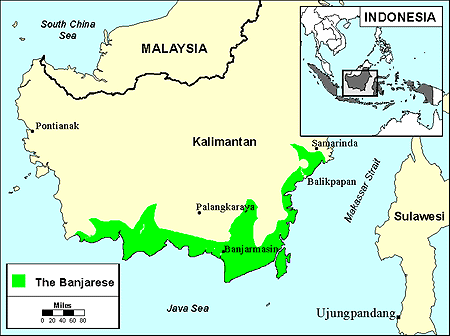|
|
Prayer Profile
The Banjarese of Indonesia
![[IMAGE]](../images1/0245.jpg) The Banjarese are one of the major people groups of Indonesia and Malaysia. The almost two million Banjarese in Indonesia live on the island of Borneo, mainly around the city of Banjarmasin in southern Kalimantan. Approximately 221,000 Banjarese live in Sabah, Malaysia.
The Banjarese are one of the major people groups of Indonesia and Malaysia. The almost two million Banjarese in Indonesia live on the island of Borneo, mainly around the city of Banjarmasin in southern Kalimantan. Approximately 221,000 Banjarese live in Sabah, Malaysia.
The origin of the Banjarese (who are also known as the "river culture") resulted from the mixing of Javanese and Malay cultures. Long ago, they were united by a ruler who professed faith in Buddhism, Hinduism, and Islam. It was then that the kingdom of Banjar grew, and the tribe of the Banjarese originated. As a result of their trading and seafaring way of life, the Banjarese gradually expanded from Kalimantan to other parts of Borneo.
In general, the Banjarese are friendly and non-threatening. They speak a local Malay language called Banjar, a part of the Malayo-Polynesian language family. In addition, most of the people understand Bahasa Indonesian.
What are their lives like?
Indonesia is the fourth most populous nation in the world and continues to grow rapidly. It has one of the most ethnically diverse populations in the world, with more than 300 distinct people groups. Many of these groups, including the Banjarese, are Muslim.
The Banjarese traditionally made a living from seafaring and trading, but now they are mostly farmers and fishermen. Although rice is the major crop grown, much is still imported, usually from Thailand. Other Banjarese are involved in building, with stone, coral sand, and clay being extracted for use as building materials.
The staple Banjarese food is rice, and side dishes consist of all kinds of fish and vegetable curry soups. In everyday life, lunch is the most important meal to the Banjarese.
As rural people, the Banjarese live mainly in villages along the coasts or roads. In addition to the villages, there are also plantation settlements. Most of the homes are thatch-roofed houses built on stilts four to eight feet off the ground. Homes of the wealthier, however, have plank floors and tile roofs.
Traditionally, the Banjarese were organized into a somewhat feudal social organization with a distinct division between the common people and nobility. The chief of the district was a nobleman. Class distinctions still exist today, but the nobility has now been replaced by appointed and elected officials who are subject to a parliament.
The typical Banjarese household consists of the husband, his wife, and their children. Marriages have traditionally been arranged by the parents and are governed by Islamic law. According to Islamic tradition, a man is permitted to have as many as four wives. However, a majority of the Banjarese practice monogamy (having only one spouse). Couples are married by registering with the local imam (local Islamic leader).
Indonesia has more than eight million farmers who do not own their own land. To those willing to move from overcrowded Java, Bali, and Madura to the less developed islands, the government offers free land, housing, and other assistance. In some areas, including Kalimantan, this has caused problems as migrants have moved into the area.
What are their beliefs?
The first major Christian outreach to the Banjarese was conducted by the Dutch during their colonization of Indonesia. However, having converted to Islam around the fifteenth century, the Banjarese have remained faithful to Islam.
The Banjarese of Indonesia are still 100% Muslim and observe Islamic religious holidays. Nevertheless, some Hindu-based ideas linger, such as old beliefs in spirits of the soil and seeking relief through medicine men. In addition, many practices, especially weddings, are actually Hindu-Buddhist in content but mixed with Islamic rites.
What are their needs?
There are no Scriptures in the Banjar language nor are there any missions agencies working among the Banjarese at this time. They are in desperate need of Christ. Intercession is the key to opening the door to these needy Indonesian people.
Prayer Points
- Ask the Lord of the harvest to call those who are willing to go and share Christ with the Banjarese of Indonesia.
- Pray that Christian radio broadcasts, evangelical literature, and the Jesus film will soon be made available to the Banjarese.
- Pray that God will reveal Himself to the Banjarese through dreams and visions.
- Pray that God will use Indonesian believers to share Christ with the Banjarese.
- Ask the Lord to save key leaders among the Banjarese who will boldly proclaim the Gospel.
- Take authority over the spiritual principalities and powers that are keeping the Banjarese bound.
- Ask God to raise up a mighty army of intercessors to stand in the gap for the Banjarese.
- Pray that strong local churches will be raised up among the Banjarese.

See also the following Group:
The Banjarese of Malaysia
Statistics
Latest estimates from the World Evangelization Research Center.
THE PEOPLE
- People name: Banjarese
- Country: Indonesia
- Their language: Banjar
- Population:
- Largest religion:
- Christians: 0%
- Church members: 0
- Scriptures in their own language: None
- Jesus Film in their own language: None
- Christian broadcasts in their own language: None
- Mission agencies working among this people: 0
- Persons who have heard the Gospel: 310,700 (16%)
- Persons who have never heard the Gospel: 1,631,400 (84%)
THEIR COUNTRY
- Country:Indonesia
- Population:
- Major peoples in size order:
- Major religions:
- Number of denominations: 113
© Copyright 1997
Bethany World Prayer Center
This profile may be copied and distributed without obtaining permission
as long as it is not altered, bound, published
or used for profit purposes.
![[HOME BUTTON]](../graphics/home.jpg)
![[CALENDAR BUTTON]](../graphics/calico.jpg)
![[LIST BUTTON]](../graphics/listico.jpg)
[Home]
[Calendar]
[Country List]
|